UMMC renames room for beloved SOM educator, father figure
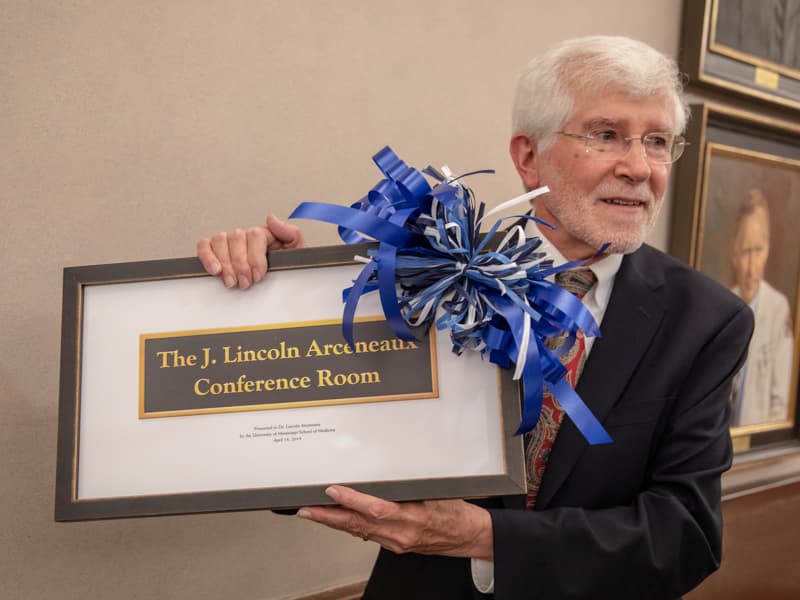
When Dr. J. Lincoln Arceneaux stepped onto the University of Mississippi Medical Center campus Thursday, sirens were shrieking and employees were scurrying for safety against a storm.
It may have been the noisiest entrance the soft-spoken former faculty member ever made. Also the most ironic one: During his 38-year career at the Medical Center, Arceneaux’s office was a haven for students tossed by the storms of their personal lives.
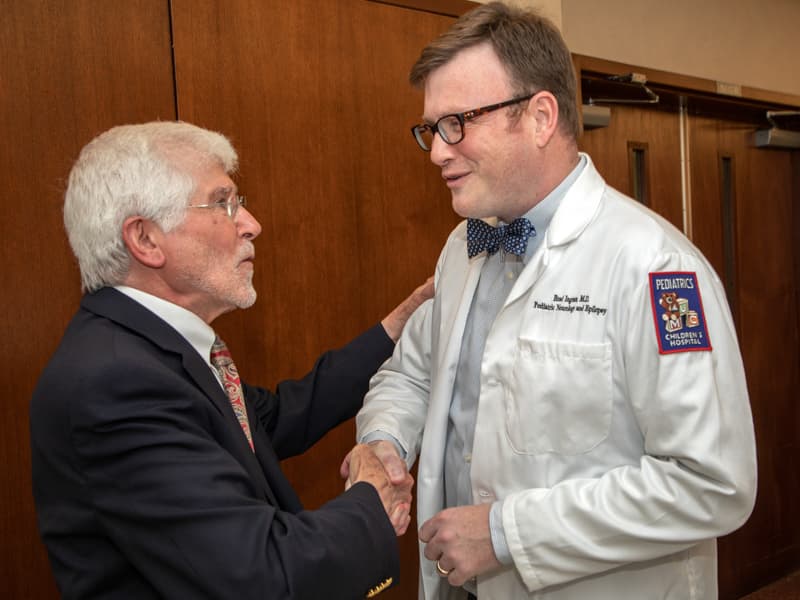
“If not for him, I wouldn’t have gotten my M.D.,” said Dr. Brad Ingram, assistant professor of pediatric neurology. “On three occasions I strolled into his office, ready to quit. He said, ‘Let’s talk about this.’”
On Thursday, Ingram was one of dozens of well-wishers who gathered to pay homage to Arceneaux, associate dean emeritus of student affairs for the School of Medicine, and associate professor emeritus of microbiology and immunology.
The ceremony marked the naming of the J. Lincoln Arceneaux Conference Room – otherwise known as R136 – where Arceneaux often met with his colleagues on committees considering those who got promoted and those who got into medical school.
“It was a pleasure to have been involved with all those students all those years, in the classroom, in the hallway, for the admissions process,” Arceneaux said in a pre-ceremony interview.
“In interacted with all the students, in all the schools; they came to me directly, in my lab and in my office. It was an honor.”
Accompanying him on campus was another distinguished guest, Dr. Jean Arceneaux, associate professor emeritus of microbiology and immunology – his wife.
“We cannot celebrate Dr. Lincoln Arceneaux without celebrating Dr. Jean Arceneaux. They are a dynamic duo,” said Dr. LouAnn Woodward, vice chancellor for health affairs and dean of the School of Medicine.
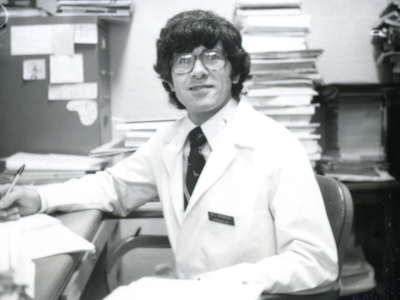
“Dr. Lincoln Arceneaux touched the lives of some 3,000 students. And one of them was me.
“Student Affairs can be a difficult and messy kind of job …, but he always carried it off with grace and from a position of kindness. I think the harshest thing I ever heard him say was, ‘Something is not quite right.’
“It’s fitting that we put his name on the room where he spent so much time.”
Arceneaux’s time at UMMC, where he was recruited, began in 1970, more than 200 miles from his home.
The Lafayette, Louisiana, native grew up in nearby Scott, wrapping himself in the region’s culture and cuisine.
“We’ve shared a love for students, certainly, but also of all things south Louisiana,” said Arceneaux’s successor, Dr. Jerry Clark, chief student affairs officer and associate dean for student affairs.
“I always got a thoughtful note from him on Bastille Day. We’ve debated or reminisced over our favorite Creole recipes at length. Turducken, as I recall, was one of Lincoln’s favorites.”
Arceneaux was a Ragin’ Cajun at what is now the University of Louisiana at Lafayette before earning his Ph.D. in microbiology at the University of Texas at Austin in 1968. His next stop was Princeton University, where he completed a National Institutes of Health fellowship before joining UMMC.
At the Medical Center, Arceneaux also mentored students seeking graduate degrees. Once the School of Dentistry opened, he taught its students as well. He served as advisor to the Associated Student Body.
“For the students, he was like their educator and their father,” said Dr. Olga McDaniel, UMMC professor emeritus of surgery.
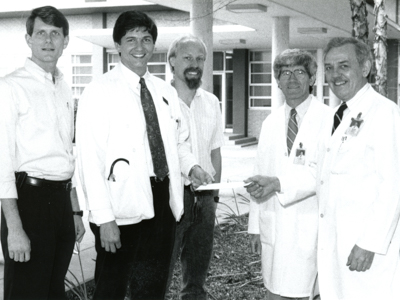
In 1976, medical students named Arceneaux Preclinical Professor of the Year. Two years later, he was appointed assistant dean for student affairs in the School of Medicine and was promoted to associate dean in 1992.
UMMC’s 2006 yearbook is dedicated to “J. Lincoln Arceneaux, PhD.”
Throughout his dealings with students, he was “unflappable,” Ingram said.
“Medical students are lovely human beings, but they can be high-strung to the point where they’re a little crazy. But it was impossible to ruffle his feathers. We tried.
“Sometimes we need an external person who is in the know to guide us through both that situation and that struggle. He was that for me and so many other students.
“I knew that I could trust both his counsel and that he wanted what was best for me.”
Arceneaux was also the “in-house authority on mushrooms,” said Virginia Covington, project manager in the Office of Student Affairs, who had been Arceneaux’s secretary.
“He would get up in the middle of the night and go to the emergency room and make sure a child had not been poisoned.
“With the medical students, he had a kind way about him, he made everything better, even when we had to give them bad news. He always showed true compassion. He was feeling it, too. And students could tell.”
His considerateness also defined his relationships with colleagues, including Clark, who took over for him in student affairs.
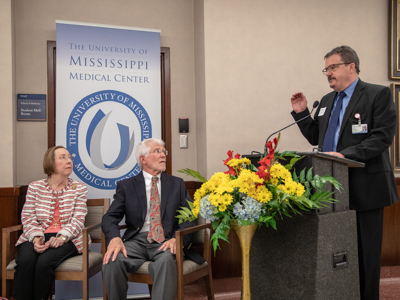
“He was so very helpful to me as a young man trying to get in this business of taking care of students,” Clark said. “He is the kindest and most thoughtful man I’ve ever met … Just honorable.
“I’m proud of the work he’s done, groundbreaking work, for this school, for this institution and, most importantly he’d say, I’m sure, for its students.
“I love you, Dr. Arceneaux,” Clark said, acknowledging the “dynamic duo” seated near the podium, “and I love you, Dr. Arceneaux.”
Lincoln Arceneaux retired in 2008; just four years later, he had to face some bad news of his own: a hemorrhagic stroke, which occurs when blood from an artery begins bleeding into the brain.
His soft, quiet voice was all but silenced. Unable to find the words he needed to express himself, he fought to regain his power of speech through therapy at the Methodist Rehabilitation Center – a battle chronicled here.
During a conversation before Thursday’s ceremony, Arceneaux made reference to his battle and struggled at times to find the right word, but always did – as he did later in his formal remarks:
“For me it has been a very special opportunity to be at the Medical Center [at a time] when so much needed to be done,” he said.
“Thank you, each one of you, for taking the time to be able to come here ... so I can get to see you and say hello again.”

